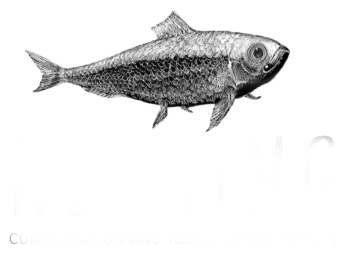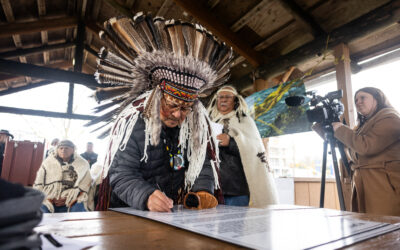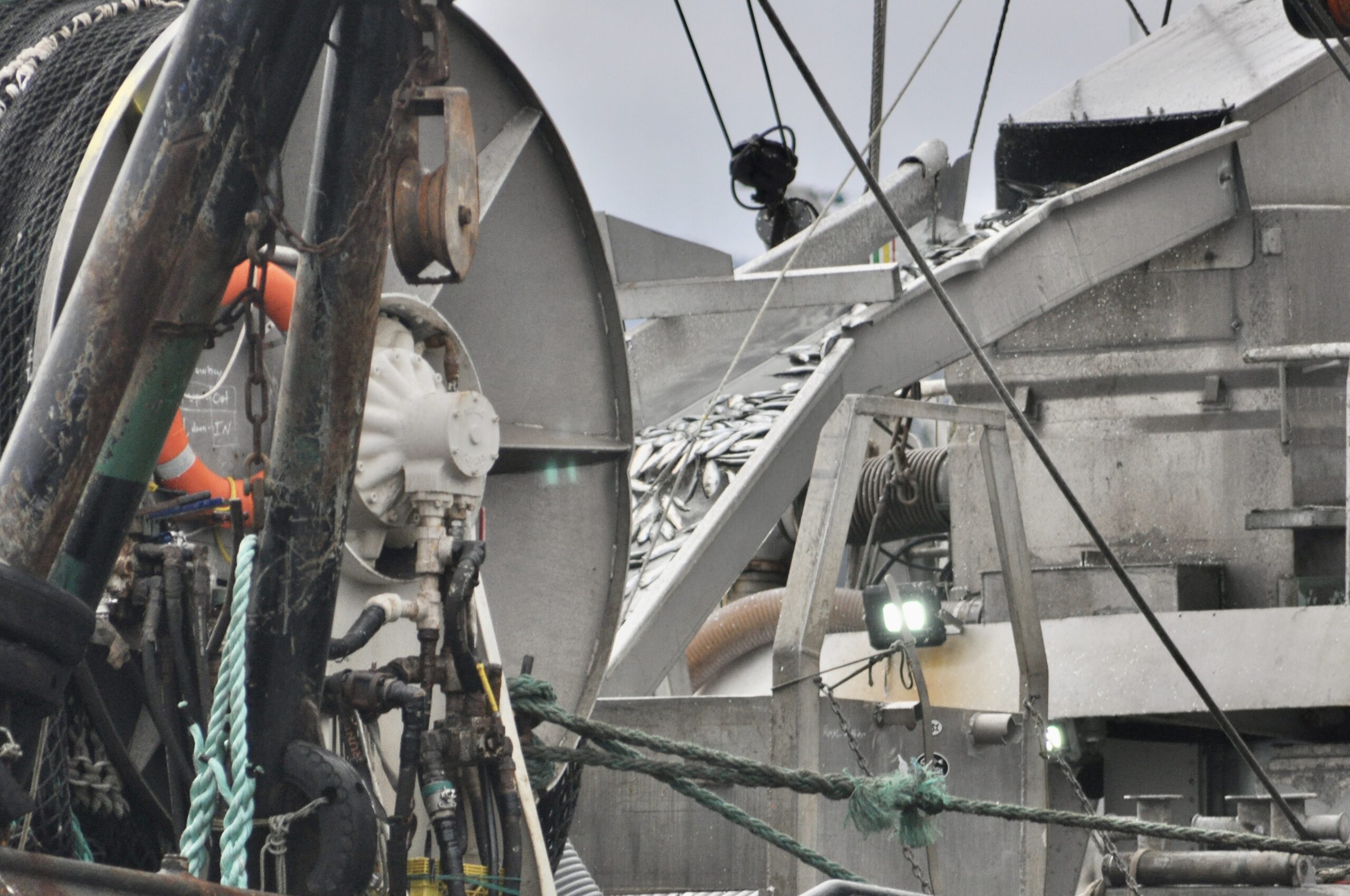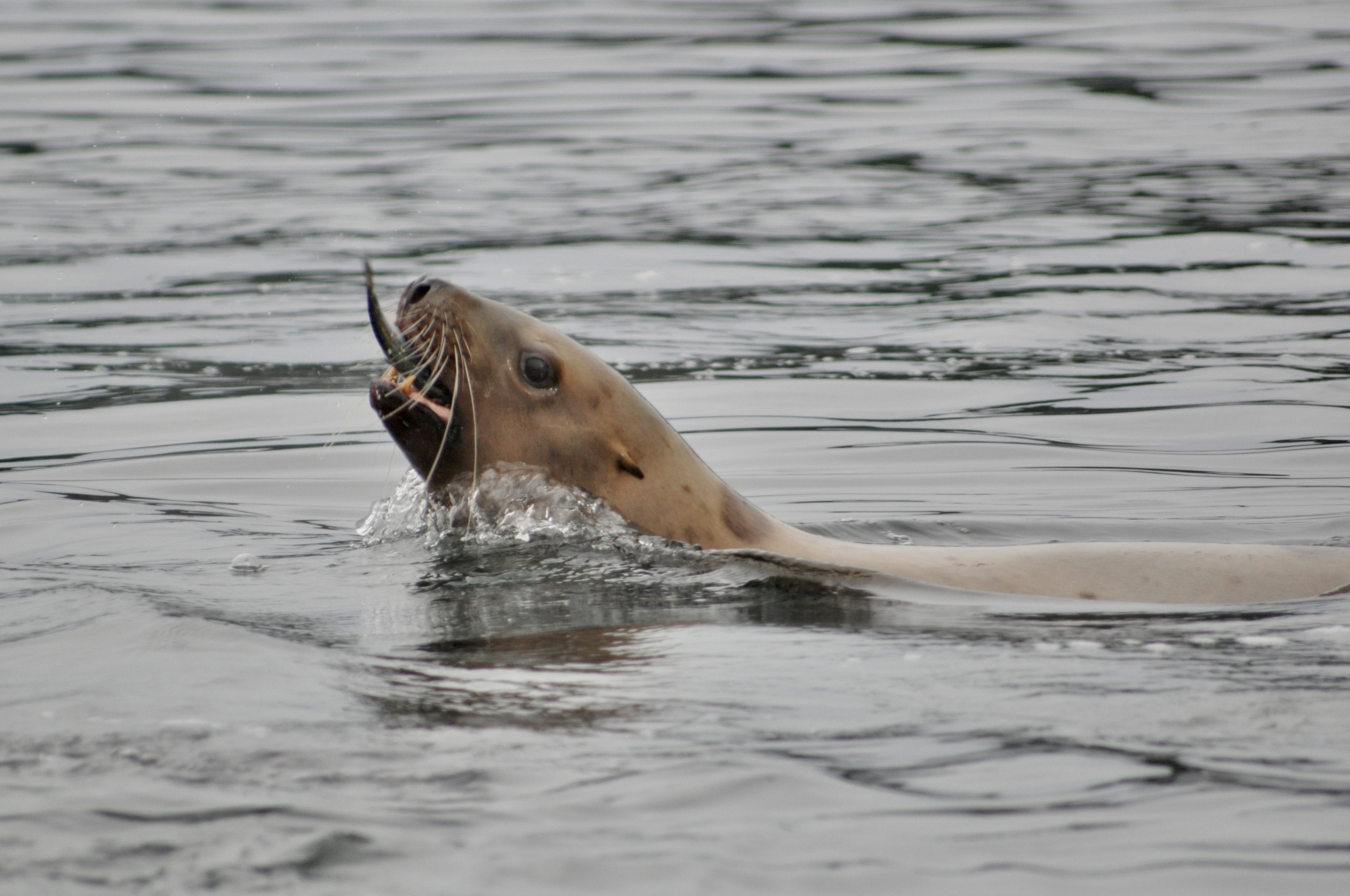Agenda for February 13, 2025
8:30 – 9:15 Arrival and Refreshment
- Adam Olsen MC calling everyone at 9:10. Please arrive early to
park, register, refresh and be seated for a 9:15 start.
9:15 – 10:00 W̱SÁNEĆ Welcome
- W̱SÁNEĆ drummers
- WEC’KINEM Eric Pelkey on behalf of W̱SÁNEĆ Hereditary Chiefs
- update events since last forum where first declaration drafted
Collaboration between First Nations, rural communities, environmental
organizations, ecotourism to restore the Salish Sea’s distinct herring
populations and develop a strategy to bring vitality back to communities for
whom herring was a foundational species.
9:45 – 10:15 Keynote Speaker: SHULQWILUM, Ray Harris, Stz’uminus, Q’ullhanumutsun Aquatic
Resources Society
Video: Slhewut-Hul’q’umi’um Knowledge of Herring
10:15 -11:00 Other Leaders Welcomed to Speak
11:00 – 11:15 Break: Snacks and Refreshment
11:15 – 12:00 Herring, Health and Culture Connections
- Dr. Iain McKechnie, zooarchaeologist Uvic, about herring
importance and distribution in pre contact sites - Dr. Eric Yoshida, UBC and Vancouver Coast Health
- Dr. Shannon Waters, Stz’uminus First Nation, Deputy Provincial
Health Officer - Xwulslim, Connie Crocker, Pune’luxutth introducing Silver
Highways Video - Q & A run out ‘til noon
12:00 – 1:00 Lunch: Salmon chowder, beef and barley and charcuterie
Elders open and close the table.
Silver Highways video
1:00 – 2:00 Herring Science and Culture
- Dr. Daniel Pauly (UBC Institute for Oceans and Fisheries)
- Dr. John Driscoll (Suzuki Foundation)
- Chrissy Chen (Tsawout Fisheries Manager)
- Dr. Ben Neal (UVic Sustainable Fisheries)
- Q & A run out ‘til snack
2:00 to 2:15 Break: Snacks and Refreshment
Before we head into the break, Adam introduces the Herring School
Approach to building break out groups and prioritizing actions. Return to
your table to start schooling up.
2:15– 3:15 Schooling Up
- Forming herring schools to prioritize actions: What are the three
top things we can do to support one another towards our
common vision? Each group of 8 determine their top priority
actions.
3:15 – 4:00 Big Herring School: Adam to lead
- Each group of 8 presents priorities to the whole group
- How do we work together? Where do we go from here?
- Identify the next time to meet and how that meeting might look.
- Summarize what materials will be distributed to participants after
the meeting, e.g., meeting notes and visuals and videos. - Invitations to chiefs to close the day.
Speaker Bios
SHULQWILUM (Ray Harris) Stz’uminus First Nation (Keynote speaker)
Ray Harris is a member of the Stz’uminus First Nation on Vancouver Island (formerly Chemainus First Nation). He has a broad range of cultural, political and on the ground experience in First Nations issues. He previously served for 10 years as the elected chief of the Stz’uminus First Nation which provided him a breadth of experience in finding solutions to issues affecting his community.
Mr. Harris is an active commercial fisherman who travels yearly up and down the BC coast. He has been instrumental in organizing the Coast Salish Gatherings and the formation of the Coast Salish Council which focuses on environmental and resource health in the Coast Salish Sea and region. Ray is the father of 11 children and has many grandchildren and great grandchildren. All of these experiences are guided by Ray’s deep connection and participation in the cultural traditions of the Coast Salish.
Mr. Harris was elected in 2008, 2010, 2013 and again in June 2016 as co-chair, the 2 member administrative executive of the First Nations Summit. Ray is an advisor to the Salish Sea Institute and the Q’ul-lhanumutsun Aquatic Resources Society for whom he has recently prepared an educational series on the rebuilding of Pacific Herring populations in his territory. He is also on the Port Authority ECHO team for which he has a responsibility to the Southern Resident Killer Whales.
Xwulslim (Connie Crocker), Pune’luxutth Tribe
Connie Crocker is an elder from the Pune’luxutth Tribe. She grew up on a 40 acre reservation on the north end of Galiano Island alongside her three sisters and two brothers. This upbringing close to the sea and her experience with the cultures and traditions of First Nations peoples instilled in her a deep connection to the ocean and marine life. Her family has roots in commercial fishing, and she went on to spend many years in the industry before severe declines in fish stocks forced her and her family to move in other career directions. She worked with the Department of Fisheries and Oceans Canada (DFO), leading in the management of freshwater and marine resources. She has served on her community’s tribal council as a liaison between First Nations and conservation efforts. Now, she is a part of the Kelp Rescue Initiative at the Bamfield Marine Science Centre. This work is focused on restoring healthy oceans to support coastal communities.
Dr. Iain McKechnie (UVIC coastal zooarchaeology; historical importance of herring based on archaeological records)
Dr. Iain McKechnie is a coastal archaeologist and associate professor of Anthropology at the University of Victoria. His research considers how archaeological records of Indigenous fisheries can expand perspective on coastal ecosystems and resource management and conservation. Dr. McKechnie directs the Historical Ecology and Coastal Archaeology Lab as well as the UVic Zooarchaeology Lab and is involved in ongoing research with Nuu-chah-nulth First Nations, the Hakai Institute, Pacific Rim National Park Reserve, and the Bamfield Marine Sciences Centre.
Dr. Daniel Pauly (UBC Fisheries Centre; history of overfishing in a larger context)
Dr. Daniel Pauly is a France-born marine biologist with over 50 years of experience in researching fisheries across the world. His work is focused on the human impacts on fisheries, publishing hundreds of books and scientific papers on the effects of overfishing. He is well known for his development of the concept of shifting baselines. Dr. Pauly became a professor at the Institute for the Oceans and Fisheries, based at the University of British Columbia in 1994, and directed it from 2003 to 2008. Pauly is the Principal Investigator leading the Sea Around Us, a large research project dedicated to identifying and quantifying global fisheries trends. He co-founded FishBase.org, which is an online encyclopedia of over 30,000 fish species. Dr. Pauly has received many international awards and prizes. He has 7 honorary doctorates from universities in Canada and Europe, he was named a Fellow of the Royal Society of Canada in 2003, and became a University Killam Professor in 2016.
Dr. John Driscoll (Fisheries Science and Policy Analyst, David Suzuki Foundation; on herring models and conservation)
Dr. John Driscoll is a fisheries science and policy analyst. He holds a PhD from the University of British Columbia’s Institute for Resources, Environment, and Sustainability, where he is now an adjunct professor. With over 20 years of experience in fisheries and marine conservation, he serves as the fisheries science and policy analyst for the David Suzuki Foundation. Dr. Driscoll believes that food production is the single greatest driver of direct anthropogenic impacts on both terrestrial and marine ecosystems. He aims to bring a food system perspective to fisheries, hoping to engage in work that results in the integration of a food system perspective with ecosystem-based fisheries approaches.
Chrissy Chen (Tsawout Fisheries Manager; on First Nations perspectives on industry)
Chrissy Chen is Tsimshian, from Port Rupert on Northern Vancouver Island. She has been the Fisheries Manager for the Tsawout Nation since early 2021, where she oversees the commercial fishery, habitat enhancement, enrichment, and policy management. She also coordinates the planning and distribution of Food, Social, and Ceremonial fish, and sea urchins and prawns for all Tsawout families. Long before her role at Tsawout, she worked at a hatchery doing enhancement, restoration, and rehabilitation. She has also worked as a technician and a coordinator in the fishery field. She has served as a consultant with Gwabalis Fisheries Society, and as the Fisheries Manager for Twakuitl Band Council. Chrissy believes that water is extremely important to all human beings, and she is deeply connected to the water. She is committed to sustainability in her work at Tsawout.
Dr Ben Neal (UVIC marine sciences prof, MC of science panel, to start with a short intro to stock and substock issues for local herring)
Dr. Benjamin Neal is a marine ecologist and assistant professor at the University of Victoria in the Environmental Studies and Biology faculties. He is interested in ecosystem response to local and global anthropogenic disturbance, marine resource conservation and sustainable utilization, and the advanced sensing of benthic marine ecosystems.
Dr. Eric Yoshida (Liver disease expert, presenting at forum via pre-recorded interview with Eric Pelkey)
Dr. Eric Yoshida is a gastroenterologist, clinical researcher, and Professor of Medicine at the University of British Columbia. As a Transplant Hepatologist at Vancouver General Hospital, Dr. Yoshida specializes in liver health and liver transplantation. He has been involved with the liver transplant program since 1991, when he was still a medical resident. He has been a part of this evolving field of research and practice ever since, remaining active in leadership roles in many academic and medical communities. Dr. Yoshida has a passion for providing care to marginalized and underserved populations. His clinical research showed that First Nations people, especially in BC, are more likely to suffer from Primary Biliary Cholangitis and autoimmune liver disease. This research challenged negative stereotypes existing in medical assumptions, that Indigenous individuals coming to the hospital with liver problems were alcoholics, rendering them ineligible for liver transplants. It was this research and medical advocacy that led him to be awarded the Order of British Columbia in 2016.





0 Comments